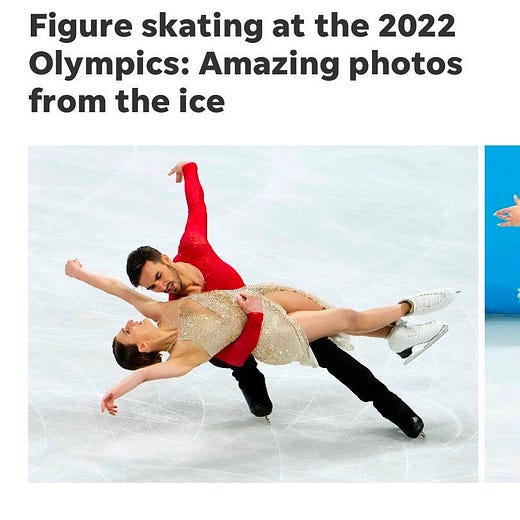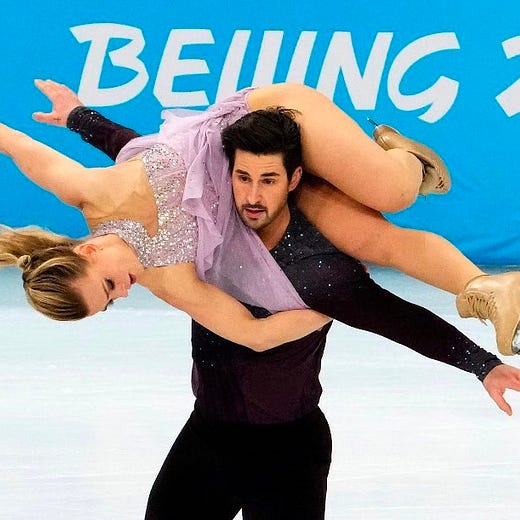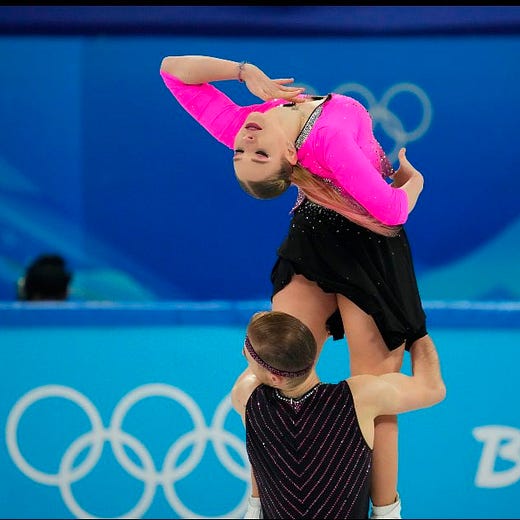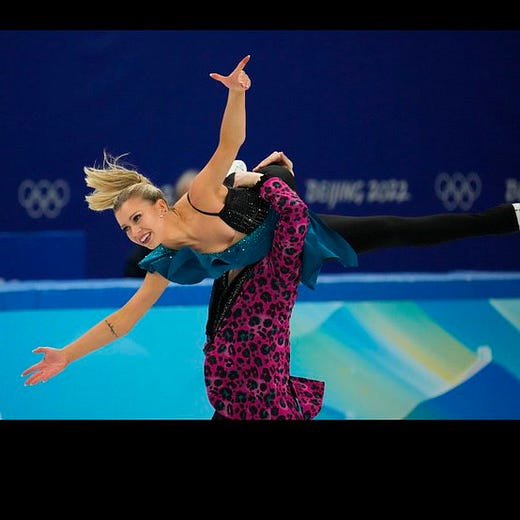When should you talk to your kids about race?
A conversation on raising anti-racist children.
The New Fatherhood is an open and honest conversation about modern fatherhood, with a bunch of dads figuring it out along the way. Here's a bit more information if you're new here. You are one of the 3,086 dads (and curious non-dads) signed up. If you've been forwarded this by someone else, why not get your own?
It’s natural to want to protect our children—from pain, fear, stress, discomfort. But perhaps we should be preparing them for the world, not protecting them from it.
In 1976 President Ford formalised the observance of Black History Month “to honour the too-often neglected accomplishments of Black Americans in every area of endeavour throughout our history.” It is an opportunity not only to focus on the contributions of African Americans to the United States, but for all of us to contemplate our own relationships with race—including our children, and how they think about it.
My parents were born in Ireland, and emigrated to the UK before I was born. In 2016 I too left the country of my birth, moving from the UK to live briefly in the US, and now residing in Barcelona, where we’ve been for the last three years. My wife—also a child of parents who migrated to the UK—and I now raise two biracial children in a country we weren’t born in. I’m on my own personal learning journey learning about race, and how to talk to my children about it. I’m sure many of you are too.
So this week, for the final newsletter of the month, I wanted to dedicate this space to a discussion on anti-racism, and how to raise anti-racist kids. For those unfamiliar with the term “anti-racism” (of which there is no shame, it’s a relatively new concept for many, including me) this definition from Ibram X. Kendi’s bestselling book “How to be Antiracist” should offer some help:
“There is no neutrality in the racism struggle. The opposite of “racist” isn’t “not racist.” It is “antiracist.” What’s the difference? One either believes problems are rooted in groups of people, as a racist, or locates the roots of problems in power and policies, as an antiracist. One either allows racial inequities to persevere, as a racist, or confronts racial inequities, as an antiracist. There is no in-between safe space of “not racist.”
Of course, as a white man, my expertise and experience in this area is limited. That’s why I am so grateful to Sharon Hurley Hall—the brain behind Sharon’s Anti-Racism Newsletter, and a fellow Substack Fellow—for taking time to discuss a topic that is never far from my mind.
Sharon has been writing about anti-racism for the last few years, and also covers these subjects as a DEI educator, podcast host and professional speaker. She grew up in the Caribbean, before living in England for 15 years, and eventually heading to Barbados where she now resides.
This is a lightly edited version of our discussion.
Thanks for finding the time to talk Sharon. When do you think is the right time for parents to start talking to their children about race?
Well, if your children are asking questions about race, it's already the right time to talk about it. Because I think a lot of white parents say, “should I be introducing my children to this at a very young age?” But black and brown kids encounter the harsh realities of racism from a very young age—many black children are 5 or 6 years old when somebody first uses the N word to them. So if black kids have to learn about it that young, shouldn’t white kids too?
Then you tailor it to your children's age. Sometimes, when children are young, you can talk about notions of fairness—because children understand that concept from a young age. Is it fair that people are treated differently based on the colour of their skin? Is it fair that some kids are picked out as troublemakers while others are not? Is it fair that some children are allowed to wear their hair the way it grows on their head, while others are not?
As they get older you can go into more depth on the issues that they raise—topics like colonisation and enslavement, but at a level that’s appropriate. Everybody will know what their children can handle. But just because a topic is tough, or it doesn’t paint your ancestors in the best light, it doesn't mean you should avoid it.
Often what needs to be done first is that parents to educate themselves—to read the right books, watch the right movies and documentaries—so they can feel equipped to talk about these topics.
Exactly. As a parent, if you want to raise anti-racist kids, you have to be on that lifelong journey yourself. And it's not a question of simply reading and learning. It's a question of applying, a question of acting. Because we grew up in a system which—subtly or overtly—says that it's better to be white. So we all have to fight that every day. Subtle little things like the parent who grabs their bag a little tighter when they pass by a black person. Bigger ones like calling it out when you see someone singled out because of the colour of their skin. And yes, it's hard to do. Some of us don't like causing confrontation. But if you want your kids to understand that racism is wrong, then the first place they're going to learn that is from you—how you behave, how you call it out, how you act in relation to people who are different—that will be their most important lesson.
Teaching them not just through what you say, but what you do.
Well, we all know children will copy what they see, right?
Absolutely. So, what are some of the common mistakes you see from well-meaning parents who are talking to their children about race?
A very common one is teaching children not to see colour. You hear a lot of people say, “I don't see colour,” as if it is a good thing. But I can tell you, from the point of view of a black person, that it really isn’t. Because I want to be seen in my entirety. People want to be seen and accepted. People want to feel they belong. And I use those two terms, acceptance and belonging, very intentionally. It's not about tolerance. It's not about inclusion. Those suggest somebody else gatekeeping who can be let in. It's about belonging and acceptance. It's about all of us automatically being part of things. You have to teach your children that it is okay to recognize difference but it is not okay to use that difference as an excuse to treat people badly or exclude them.

Another mistake parents make is to see racism only as name calling. There's a perception that if you're not out there calling people the N-word or the P-word then you're not really racist. But we need to remember—and this isn't my phrase, but I've always found it very useful—that white supremacy is the water, and not the shark. We're all swimming in this idea that whiteness is supreme. So it’s not about “did you call this person a bad word” but “have you made this person feel welcome? Have you recognised their right to belong? Did you treat this other person differently than you would have done if they had the same skin colour as yourself?”
“To be antiracist is to focus on ending the racism that shapes the mirages, not to ignore the mirages that shape peoples’ lives.”
— Ibram X. Kendi
What about the media that our children consume?
I've had many conversations with newsletter subscribers and others asking “how do I diversify the input that my children are getting? How do I give them a worldview that's not whiter than white, no matter where we happen to live?” The great thing is that we're living in a world where information is at our fingertips. It's not like 30—or even 20—years ago, for that matter. There's much more around.
I grew up in the Caribbean, and then lived in England, and practically every book that was available had white protagonists in the key roles. I had no expectation that anybody in any of the books that I read as a child and even many of the books I read as an adult were going to reflect me or my experience. That is just not how I have experienced the world.
But you have to be intentional about it. That's not what the algorithms will show you. I want something that represents indigenous culture. I want something that has some black people in it.
What do you think about the recent work Disney have been doing in this space?
I will give a caveat that I'm not as familiar with Disney's work as I was, say 15 years ago when my daughter was young. But it’s a good step forward that people are thinking about this, and they're trying to be more representative. I still question who is creating the programs? What worldview is being pushed? What perspective is being pushed? Are those characters of colour actually well rounded? Are they main characters or are they sidekicks? Are they falling into traditional stereotypes or not? There's a lot of work that needs to happen behind the scenes.
I think some of the latest Disney movies—Encanto, Coco, Moana— have made good strides forward here. But then the question becomes “why are they doing it?” There's obviously money to be made—you only have to look at the success of Black Panther, which didn’t shy away from celebrating black history and culture.
They suddenly discovered that black people spend money! Like this wasn’t true all along. There's always been this idea in Hollywood, and in TV, that making things for black audiences was going to lose money. And I think Black Panther just blew that out of the water. It was incredibly popular across the board. This actually got me back into superhero movies because, again, I had never seen myself represented in any of those films—a lot of the stuff I saw growing up, if there were black people in them, they were either buffoons or comic relief, thugs and gangsters from the underworld, or enslaved people, all those old stereotypes.
I remember being at Google and taking part in Sojourn, an experimental training which aimed to help participants see their blindspots around structural racism and own unconscious biases. It made me incredibly uncomfortable to see how I was contributing to these problems, and had no idea about it. You're like “oh, wow, shit … I guess that's why they call it unconscious bias.” You have no idea it's there. It uncovers all the work you need to do.
Once you’re aware you have these biases you have to force yourself to notice them, then to actively work to counter them. Anti-racism is not just about reading and learning, it’s about action. You have to do it in your own lives and set that example for your children as a parent.
Kids start to notice and inherit these biases when they're very young. There was a program that aired last year called “The School That Tried to End Racism” where they did unconscious bias tests and workshops with different groups of children and saw their attitudes toward race transform.
The other thing that’s really important is that parents work to break out of their bubbles, because all the research suggests that the way to fight racism is through familiarity with other groups—the more time you spend with people who are different from you, the more you're going to see them as just like you. So don't take your children to the playgroup that is full of people like you—go to one in a different area where they’ll get to see people of other races. Don't put them don't put them in a school that is almost completely white. Travel with them to other places, let them feel what it feels like to be in the minority. All of these things you can do, as a parent, to switch it up a bit. You have to break out of your comfort zone.
Because part of the problem for many parents is the discomfort they feel with this. I was reading a book called “The Wake Up” by Michelle MiJung Kim and she explained how we can’t mix up the need for white comfort with problems that affect black safety. Comfort and safety are not the same thing. If you are prepared to push through the discomfort of your own anti-racism education and raising anti racist kids then you make the world safer for black people. And if you do that you make it safer for everyone.
Finally, are there any books you’d recommend for parents who want to learn more about anti-racism?
“How to be an Antiracist” by Ibram X. Kendi for parents, his children’s book “AntiRacist Baby” and the the young reader edition of his book “Stamped” are all excellent.
“So You Want to Talk About Race” by Ijeoma Oluo, which also has a young reader edition.
“Brit(ish) by Afau Hirsch” explores race from a UK perspective.
“The Wake Up” by Michelle MiJung Kim which I’ve already mentioned.
“Caste” by Isabel Wilkerson which is, of course, phenomenal.
“When we identify where our privilege intersects with somebody else's oppression, we'll find our opportunities to make real change.”
― Ijeoma Oluo, So You Want to Talk About Race
3 things to read this week
“Raising Race-Conscious Children” by Joanna Goddard in Cup of Jo. Enjoyed this conversation with Sharon? Want to dive deeper on how to tackle these issues as a parent? A good place to go next is this 2016 conversation between OG Mommy blogger Jo and two of the founders of the Raising Race-Concious Children website.
“Are Your Kids Too Young to Talk About Race?” by Pretty Good Design. A simple, beautiful and compelling collection of research that shows the different ages that children begin to make decisions about race. Comes with a useful resource guide too.
“What If We Just Stopped Being So Available?” by Joe Pinsker in The Atlantic. A swift lane change. For those of you who have emailed The New Fatherhood, I salute you. I am sorry for the delay in replying. Or am I? This essay questions today’s “norms of responsiveness” and ends with the author’s retraction of “all of my other previous apologies. I am not sorry for my delay, and I don’t expect you to be either.”
One thing to watch with the kids this week
If you’re in the UK, you can watch “The School That Tried to End Racism” on All4. This short video is a taster, a deceptively simple explanation of privilege to a group of schoolchildren, and a useful way to start a conversation with your own kids.
This week in The New Fatherhood Community
We’re going to going to try something a little new this week. I haven’t been shy in talking about my own mental health struggles, and how I’ve been managing it. It’s ended up a regular topic of conversation with the other dads in the community, so I’m going to start a regular mental health / well-being check-in there.
A very low key chat, “hey, how are you doing, how are you feeling, finding anything tough at the moment?" That kinda thing.
Will it work? I have absolutely no idea. I originally announced this in the community with “I can't promise that anyone apart from me will be there” but it seems there are a few dads who are already interested, and if it works out, if would be a nice thing to do more regularly.
Want to get involved? RSVP and attend the event today at 4pm CEST / 3pm GMT / 10am EST. If you’re already a member of the community, you’ll find a link to the event in the Geneva app.
We’ve also been talking about Monday’s essay on work, and having a revealing conversation about our jobs, career paths, and how it all fits together.
Come join the conversation.
ANOTHER thing to watch with the kids this week
Last year Sesame Street introduced Ji-Young, their first Asian American muppet, in an episode which they helpfully uploaded to YouTube in full. “A kid yelled out at me to 'go back home.' It really, really, really hurt my feelings," Ji-Young tells Elmo and friends. "It made me feel sad. And scared."
This is a powerful and uplifting statement on belonging and acceptance, with cameos from “Shang-Chi” lead Simu Liu, tennis champion Naomi Osaka, and chefs Melissa King and Padma Lakshmi. Thanks to Sharon Hurley Hall (again) for sharing this.
Good Dadvice
A final thought
“It's not our job to toughen our children up to face a cruel and heartless world. It's our job to raise children who will make the world a little less cruel and heartless.”
― L.R. Knost
Say Hello
How did you like this week’s issue? Your feedback helps me make this great.
Loved | Great | OK | Meh | Bad
Follow The New Fatherhood on Twitter and Instagram. Send me links, comments, questions, and feedback. Or just reply to this email.
Branding by Selman Design. Thanks to Sharon Hurley Hall for her input to this week’s issue. Subscribe to support The New Fatherhood and join a community of like-minded dads who are all winging it, together. If you’d like to join, but money is an issue, reply to this email and I will get you added, no questions asked. If you’d like to underwrite one of those subscriptions, you can donate one here.








Lovely. I especially vibed with this from my own life -
"I grew up in the Caribbean, and then lived in England, and practically every book that was available had white protagonists in the key roles. I had no expectation that anybody in any of the books that I read as a child and even many of the books I read as an adult were going to reflect me or my experience. That is just not how I have experienced the world."
I just wanted to say that the push in many parts of the USA to ban the teaching of Critical Race Theory in schools pushes the task of talking about racial inequality completely onto parents. I'm concerned that a lot of parents will either not do the work of equipping themselves to talk to their kids about it or find it so uncomfortable to confront their white privilege that they won't talk about it at all. I say this because I have had arguments with other dads about the very existence of white privilege, and I feel recognizing that there's an inherent bias in a country founded by rich white guys who were primarily concerned with the further enrichment of said rich white guys (to the detriment of anyone who wasn't a rich white guy) is fundamental to the discussion.